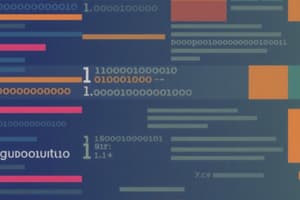Podcast
Questions and Answers
What are the components of an Information Retrieval (IR) system?
What are the components of an Information Retrieval (IR) system?
The components of an IR system include document collection, pre-processing, indexing, query processing, and retrieval.
Explain the term frequency and document frequency in Information Retrieval.
Explain the term frequency and document frequency in Information Retrieval.
Term frequency refers to the frequency of a term in a document, while document frequency refers to the number of documents in which a term appears.
Explain the PageRank algorithm in the context of web graph analysis.
Explain the PageRank algorithm in the context of web graph analysis.
PageRank is an algorithm that assigns a score to each web page based on the number and quality of links pointing to it.
What is the Boolean retrieval model in Information Retrieval?
What is the Boolean retrieval model in Information Retrieval?
Explain the importance of test collection and relevance judgment evaluation in Information Retrieval.
Explain the importance of test collection and relevance judgment evaluation in Information Retrieval.
What is learning to rank in Information Retrieval?
What is learning to rank in Information Retrieval?
Explain the concept of web crawling.
Explain the concept of web crawling.
What is the working of a web search engine?
What is the working of a web search engine?
Explain the K-means clustering algorithm.
Explain the K-means clustering algorithm.
What is hierarchical clustering?
What is hierarchical clustering?
Explain the concept of query expansion in clustering.
Explain the concept of query expansion in clustering.
What is focused crawling?
What is focused crawling?
Flashcards are hidden until you start studying
Study Notes
Information Retrieval
- Information Retrieval (IR) is the process of obtaining information from a collection of data, documents, or databases
- Applications of IR include search engines, digital libraries, and recommender systems
Components of IR System
- User Interface: allows users to input queries
- Query Processor: analyzes the query and generates a query plan
- Indexer: builds and maintains the index of the document collection
- Retrieval: retrieves documents that match the query
- Ranking: ranks the retrieved documents based on relevance
Challenges of IR
- Information overload
- Relevance ranking
- Query ambiguity
- Scalability
Inverted Index Creation
- Inverted index is a data structure used to store the indexing information of documents
- Each term in the index points to a list of documents that contain the term
Index Compression Techniques
- Run-length encoding (RLE)
- Variable-byte coding (VBC)
- Huffman coding
- Dictionary-based compression
Term Frequency, Document Frequency, and Weights
- Term frequency (TF): the frequency of a term in a document
- Document frequency (DF): the number of documents that contain a term
- Term frequency weight (TFW): a weighting scheme that takes into account the importance of a term in a document
- Document frequency weight (DFW): a weighting scheme that takes into account the importance of a term across documents
Boolean Retrieval Model and Operators
- Boolean retrieval model: a retrieval model based on Boolean logic
- Term-document incidence matrix: a matrix that represents the presence or absence of terms in documents
- Inverted index: a data structure used to store the indexing information of documents
- Boolean operators: AND, OR, NOT
Query Processing
- Query parsing: breaking down a query into individual terms and operators
- Query optimization: optimizing the query plan to improve efficiency
- Query execution: executing the query plan to retrieve relevant documents
Cosine Similarity
- Cosine similarity: a measure of similarity between two vectors
- Used in information retrieval to measure the similarity between a query and a document
Probabilistic Model
- Probabilistic model: a retrieval model based on probability theory
- Rank documents based on the probability of relevance
Spelling Correction
- Spelling correction: the process of correcting spelling errors in queries and documents
- Challenges of spelling errors: ambiguity, out-of-vocabulary words, and typo propagation
- Edit distance algorithm: a measure of the minimum number of operations needed to transform one string into another
K-gram Indexing
- K-gram indexing: a technique used to index n-grams of terms
- Used in spelling correction and query processing
Soundex and Phonetic Retrieval
- Soundex: a phonetic algorithm used to index words based on their sound
- Phonetic retrieval: a retrieval model that takes into account the phonetic similarity between words
Wildcard Query and Permuterm Index
- Wildcard query: a query that contains a wildcard character
- Permuterm index: a data structure used to index terms with wildcards
N-gram Overlapping
- N-gram overlapping: a technique used to index overlapping n-grams of terms
- Used in query processing and spelling correction
Performance Evaluation Metrics
- F-measure: a measure of the balance between precision and recall
- Augmented precision: a measure of the precision of a retrieval system
Test Collection and Relevance Judgment Evaluation
- Test collection: a standard dataset used to evaluate the performance of a retrieval system
- Relevance judgment: a human judgment of the relevance of a document to a query
Hadoop and MapReducing
- Hadoop: a distributed computing framework
- MapReducing: a programming model used in Hadoop
Web Graph and Link Analysis
- Web graph: a graph that represents the hyperlink structure of the web
- Link analysis: the analysis of the hyperlink structure of the web
- PageRank algorithm: a link analysis algorithm used in Google's search engine
- HITS algorithm: a link analysis algorithm that computes hub and authority scores
Learning to Rank
- Learning to rank: a machine learning approach to ranking documents
- Point-wise ranking: a ranking approach that trains a model to predict the relevance of a single document
- Pair-wise ranking: a ranking approach that trains a model to predict the relevance of a pair of documents
- List-wise ranking: a ranking approach that trains a model to predict the relevance of a list of documents
Web Search Engine
- Web search engine: a system that retrieves and ranks web pages based on a user's query
- Types of search engines: crawler-based, directory-based, and hybrid
- Web structure: a model of the web's hyperlink structure
- Bow-tie structure: a model of the web's structure that consists of a core, in-links, and out-links
Web Crawling
- Web crawling: the process of fetching and indexing web pages
- Features of web crawling: politeness, focus, and incremental crawling
Indexing of Web Pages
- Indexing of web pages: the process of building and maintaining an index of web pages
- Used in search engines and information retrieval systems
Clustering in IR
- Clustering in IR: the process of grouping similar documents together
- K-means clustering algorithm: a clustering algorithm that partitions documents into K clusters
- Hierarchical clustering algorithm: a clustering algorithm that builds a hierarchy of clusters
- Agglomerative clustering algorithm: a clustering algorithm that starts with individual documents and merges them into clusters
Query Expansion and Result Grouping
- Query expansion: the process of expanding a query to improve retrieval performance
- Result grouping: the process of grouping retrieved documents into clusters
Studying That Suits You
Use AI to generate personalized quizzes and flashcards to suit your learning preferences.




